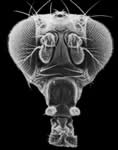Neuronal function and dysfunction.
 It can be argued that the large capacity to learn, remember and use the acquired information in novel ways is the defining characteristic of our species. The long-term goal of the research program in our laboratory is to understand the molecular mechanisms and signaling systems that mediate learning and memory and how these are altered by disease and aging. The essential nature of these processes is well documented by debilitating human conditions that disrupt them, such as learning disabilities, attention deficits and dementias such as Alzheimer's and other neurodegenerative disorders. We use a Drosophila to study processes essential for learning and memory and model the action of genes implicated in human neuronal dysfunctions such as Tauopathies, Fragile X syndrome, Neurofibromatosis 1, Noonan syndrome-like and attention deficit disorder (ADD). Beyond understanding the mechanistic aetiology of these pathologies, we aim to contribute towards their amelioration through pharmacogenetics. Recently we have also turned our attention to the mechanism(s) underlying the ability of the fly olfactory system to sense and differentiate odorant molecules according to their molecular vibrations, a fundamental contribution to the emerging field of Quantum Biology.
It can be argued that the large capacity to learn, remember and use the acquired information in novel ways is the defining characteristic of our species. The long-term goal of the research program in our laboratory is to understand the molecular mechanisms and signaling systems that mediate learning and memory and how these are altered by disease and aging. The essential nature of these processes is well documented by debilitating human conditions that disrupt them, such as learning disabilities, attention deficits and dementias such as Alzheimer's and other neurodegenerative disorders. We use a Drosophila to study processes essential for learning and memory and model the action of genes implicated in human neuronal dysfunctions such as Tauopathies, Fragile X syndrome, Neurofibromatosis 1, Noonan syndrome-like and attention deficit disorder (ADD). Beyond understanding the mechanistic aetiology of these pathologies, we aim to contribute towards their amelioration through pharmacogenetics. Recently we have also turned our attention to the mechanism(s) underlying the ability of the fly olfactory system to sense and differentiate odorant molecules according to their molecular vibrations, a fundamental contribution to the emerging field of Quantum Biology.